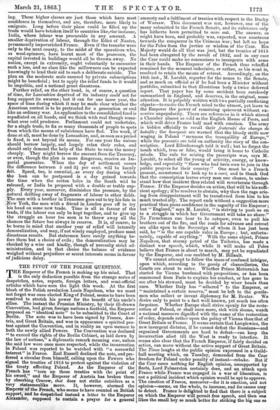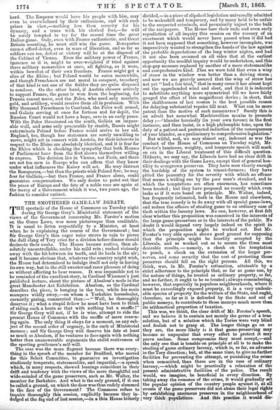THE PIVOT OF THE POLISH QUESTION.
THE Emperor of the French is making up his mind. That is the only deduction possible from the strange series of despatches, notes, reports, foreign letters, and semi-official articles which have seen the light this week. At the first blush of the Polish revolution Louis Napoleon, who we must not forget was once elected King of Poland, seems to have been resolved to stretch his power for the benefit of his uncle's allies. The instant the Prussian Ministry, by their ill-drawn Convention, had given foreign nations a foothold, the Emperor proposed an "identical note" to be submitted to the Court of Berlin. The note was to have been signed by France, Aus- tria, and Great Britain, and was in appearance a spirited pro- test against the Convention, and in reality an open menace to both the newly allied Powers. The Convention was declared "to exceed the rights of the Berlin Cabinet, as laid down by the law of nations," a diplomatic remark meaning war, unless the said law were once more respected, while the insurrection in Poland was reported to be watched with "a sorrowful • interest" in France. Earl Russell declined the note, and pre- ferred a circular from himself, calling upon the Powers who signed the treaties of 1815 to protest against the violation of the treaty affecting Poland. As the Emperor of the French has "torn up those treaties with the point of his sword," and the Emperor of Austria has broken them by absorbing Cracow, that does not strike outsiders as a very statesmanlike move. It, however, alarmed the Emperor of the French, who seems to have counted on British support, and he despatched instead a letter to the Emperor Alexander, supposed to contain a prayer for a general amnesty and a fulfilment of treaties with respect to the Duchy of Warsaw. This document was not, however, one of the many submitted to the French Senate, and its substance only has hitherto been permitted to ooze out. The answer, as might have been, and probably was, expected, was courteous towards the conqueror in the Crimean war; but left no hope for the Poles from the justice or wisdom of the Czar. His Majesty would do all that was just, but the treaties of 1815 had been abrogated by the revolt of 1832, and in any case the Czar could make no concessions to insurgents with arms in their hands. The Emperor of the French thus rebuffed remained for the moment indecisive, or rather, as his wont is, resolved to retain the means of retreat. Accordingly, on the 16th inst., M. Larabit, reporter for the nonce to the Senate, and as much an official as if he had been a Minister without portfolio, submitted to that illustrious body a twice deferred report. That paper has by some accident been carelessly summarized in England, and deserves, in the original, some attention. It is palpably written with two partially conflicting objects—to excite the French mind to the utmost, yet leave to the Emperor the power of remaining quiescent without ex- cessive unpopularity. There are references in it which stirred a Chamber almost as cold as the English House of Peers, and which will drive France half mad with emotion. The army is bidden officially to recall their fraternite des champs de bated& ; the bourgeois are warned that the bloody strife now waging in Poland "menaces the tranquillity of Europe," while the peasants are told on authority the story of the con- scription. Lord Ellenborough told it well ; but be forgot the touch which, true or false, would bring it home to Catholic minds. The rule for seizing the proscripts was, says M. Larabit, to select all the young of activity, energy, or know- ledge, and especially "those who had been seen to join in the public prayers for their country." One must be a French peasant, accustomed to look up to a cure, and to thank God that the conscription leaves every man one chance, to under- stand how that incident thus related will reverberate through France. If the Emperor decides on action, that will be his suffi- cient apology; if he resolves to abstain, why then the rage aris- ing from disappointment will be transferred from him to his much trusted ally. The report ends without a suggestion more practical than pious confidence in the sagacity of the Emperor ; but "England," says M. Larabit, "is striving to push us on to a struggle in which her Government will take no share." No Frenchman can bear to be catspaw, even to pull his brothers out of the fire, and the roads for advance and retreat are alike open to the Sovereign of whom it has just been said, he "is the one capable ruler in Europe ; but, unfortu- nately, capable of anything." With the same object, Prince Napoleon, that stormy petrel of the Tuileries, has made a distinct war speech, which, while it will make all Poles believe that France is about to march, may yet be repudiated by the Emperor, and was snubbed by M. Billault.
We cannot attempt to follow the maze of confused intrigue, upon which, according to the gossip of chancelleries, the Courts are about to enter. Whether Prince Metternich has started for Vienna burdened with propositions, or has been summoned from Paris to explain his conduct, or has gone to see after his steward, must be decided by wiser heads than ours. Whether Italy has " adhered " to the Emperor, or "maintained a certain reserve," must be left to the gentle- men who collect or invent diplomacy for M. Reuter. We desire only to point to a fact well known, yet much too often forgotten. Whether Europe shall strive openly for the resto- ration of Poland, or shall once more, sick with shame, watch a national massacre dignified with the name of the restoration of order, depends rather upon the policy of Vienna than that of Great Britain or France. It seems certain that Langiewicz, the new insurgent dictator, if he cannot defeat the Russians—and organized Governments are hard to defeat—can keep the insurrection afoot till the West is ready to interfere. It seems also clear that the French Emperor, if fairly decided on action, can move without the active support of Great Britain. The Times laughs at the public opinion expressed in a Guild- hall meeting which, on Tuesday, demanded from the Czar freedom for Poland under penalty of instant—rebuke. But if the Czar cares nothing for English opinion, unsupported by fleets, Lord Palmerston certainly does, and an attack upon France while France was engaged in a war of liberation, is not a political incident which opinion would be apt to approve. The emotion of France, moreover—for it is emotion, and not opinion—seems, on the whole, to increase, and for causes easy to detect. France is delighted to find that there is a subject on which the Emperor will permit free speech, and then one likes the small boy so much better for striking the big one so hard. The Emperor would have his people with him, may even be overwhelmed by their enthusiasm, and with such prizes in view,—nothing less than security for his dynasty, and a truce with his clerical foes,—he will be sorely tempted to try for the second time the great Italian game. Only, even with France enthusiastic, and Great Britain assenting, he must still win the game. Bouapartes cannot afford defeat, even in wars of liberation, and so far as soldiers can see, defeat or victory will be at the disposal of the Cabinet of Vienna. Even the military power of France, immense as it is, might be over-weighted if tried against three military monarchies at once, all fighting, as it were, within bowshot of their own frontiers. France might get a slice of the Rhine ; but Poland would be eaten meanwhile, and though Frenchmen are not moral in conquest, treachery of that kind is not one of the foibles they are quite disposed to condone. On the other band, if Austria chooses actively to support France, the game is won from the beginning, for Prussia cannot MOW, and the Poles, who need only muskets. gold, and artillery, would receive them all in profusion. With fifty thousand Frenchmen in Courland, the Poles well armed, and Galicia serving at once for fortress and for dept, the Russian Court would nct have a hope, save in an early peace. With the Poles threatened on the south, Galicia an impass- able wall, and arms only procurable by stealth, Russia might exterminate Poland before France could arrive to her aid. England, too, though her statesmen are sorely unwilling to move, might act in concert with Austria, for their interests in respect to the Rhine are absolutely identical, and it is fear for the Rhine which is checking the sympathy that both Houses of Parliament have from the first shown themselves willing to express. The decision lies in Vienna, not Paris, and there are not ten men in Europe who can affirm that they know under what influences the Kaiser will act. He may distrust the Bonapartes,—but then the priests wish Poland free; he may fear for Grallicia,—but then France, and France alone, could guarantee compensations. We only desire to point out that the peace of Europe and the fate of a noble race are again at the mercy of a Government which it was, two years ago, the fashion to consider extinct.































 Previous page
Previous page